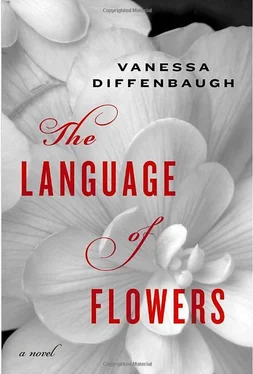“I’m not going to let you get away with anything here,” Elizabeth said. “But if you couldn’t find the spoon after a true attempt, I would have accepted a genuine apology.” Her voice was stern and direct. In the sleepy haze of early morning, I wondered if I had imagined her gentle tone of the night before.
She dipped my hands in again, watching the tiny white bubbles form for the third time. Running my hands under cold water, she patted them dry with a clean white towel. The small punctures looked deep and empty, as if the peroxide had eaten away perfect circles of flesh. With white gauze, she began wrapping my wrist, working her way slowly toward my fingers.
“You know,” Elizabeth said, “when I was six, I learned the only way to get my mother out of bed was to act out. I behaved atrociously, just so that she would get up and punish me. When I was ten, she tired of it and sent me to boarding school. The same won’t happen with you. Nothing you could do would make me send you away. Nothing. So you can go on testing me—hurling my mother’s silver around the kitchen, if that’s what you have to do—but know that my response will always be the same: I will love you, and I will keep you. Okay?”
I looked at Elizabeth, my body tight with suspicion, my breath lost in the steamy bathroom. I didn’t understand her. Shoulders tense, her sentences sharp and clipped, she spoke with a formality I’d never encountered. Yet behind her words was an inexplicable softness. Her touch, too, was different; the thorough way she cleaned my hands, without the heavy, silent burden in the actions of all my other foster mothers. I didn’t trust it.
Silence stretched between us. Elizabeth tucked a strand of hair behind my ear and looked deeply into my eyes for an answer.
“Okay,” I said finally, because I knew it was the fastest way to end the conversation and leave the heat of the small bathroom.
The corners of Elizabeth’s mouth turned up. “Come on, then,” she said. “It’s Sunday. On Sunday we go to the farmers’ market.”
She turned my body and led me back to my bedroom, where she slipped my gauze-wrapped hands out of my nightgown and into a white smocked sundress. Downstairs, she made scrambled eggs and fed me small bites on a spoon that looked identical to the one I’d launched across the room the night before. I chewed and swallowed, following directions, still trying to reconcile Elizabeth’s contrasting tones and unpredictable actions. She did not try to start a conversation over breakfast, just watched the eggs travel from the spoon into my mouth and down my throat. When she finished feeding me, she ate a small plate of eggs herself, washed and dried the dishes, and put them away.
“Ready?” she asked.
I shrugged.
Outside, we crossed the gravel, and she helped me into her ancient gray pickup. The aqua plastic upholstery peeled away from the piped edging, and there were no seat belts. The truck lurched down the driveway, dust and wind and exhaust whipping through the cab. Elizabeth drove less than a minute before turning in to what had been an empty parking lot when I had passed in Meredith’s car. It was now full of trucks and fruit stands, families wandering up and down the aisles.
Elizabeth went from stand to stand as if I wasn’t there, exchanging cash for heavy bags of produce: pink-and-white-striped beans, tan-colored pumpkins with long necks, purple potatoes mixed with yellow and red. When she was busy paying for a bag of nectarines, I stole a green grape off an overflowing table with my teeth.
“Please!” exclaimed a short, bearded man I hadn’t noticed. “Sample! They’re delicious, perfectly ripe.” He tore off a bunch of grapes and placed them in my wrapped hands.
“Say thank you,” Elizabeth said, but my mouth was full of grapes.
Elizabeth bought three pounds of grapes, six nectarines, and a bag of dried apricots. On a bench facing a long, grassy field we sat together, and she held out a yellow plum a few inches from my lips. I leaned forward and ate it out of her hand, the juice dripping down my chin and onto my dress.
When only the pit was left, Elizabeth threw it into the field and gazed to the far side of the market.
“See the flower stand over there, the last one in line?” she asked me. I nodded. A teenager sat on the open bed of a pickup truck, his feet in heavy boots hanging above the blacktop. At a table in front of him, roses lay wrapped in tight clusters.
Elizabeth continued. “That’s my sister’s stand. See the boy? Almost a young man now, it seems. That’s my nephew, Grant. We’ve never met.”
“What?” I said, surprised. From Elizabeth’s bedtime story, I’d assumed the sisters were close. “Why not?”
“It’s a long story. We haven’t spoken in fifteen years, except to divide up the properties after my parents died. Catherine took the flower farm; I kept the vineyard.” The teenager jumped off the back of the truck and made change for a customer. Long brown hair fell in front of his face, and he pushed it away from his eyes before shaking hands with an old man. His pants were slightly too short, his long, thin limbs the only feature I could find to resemble Elizabeth from the distance at which we sat. He seemed to be alone running the flower stand, and I wondered why Catherine wasn’t there.
“The strange thing,” Elizabeth said, following the boy’s movements with her eyes, “is that today, for the first time in fifteen years, I miss her.”
The boy threw the last bunch of roses to a couple passing by, and Elizabeth turned to me, snaking her arm around my back and pulling me closer to her on the bench. I leaned away, but she dug her fingers into my side, holding me still.
On my chest bone, the mistletoe rested. I studied its irregular rise and fall. Neither my heartbeat nor my breath had returned to normal since reading the stranger’s response in my palm.
I didn’t remember what I’d done with the buckets of yellow flowers. I must have done something, though, because by noon they were settled in the back of Renata’s truck, bouquets of sunshine rolling down the freeway to brighten someone’s near-winter wedding, and I had stretched out alone on top of the worktable. Renata had asked me to keep the shop open, but no one came in. It was usually closed on Sundays, and I kept the door unlocked but the light off. I wasn’t technically disobeying Renata, but I wasn’t exactly inviting business, either.
My forehead was wet with sweat even though the morning had been cold, and I was frozen in a state of fascination resembling terror. For years my message-laden flowers had been faithfully ignored, an aspect of my communication style that gave me comfort. Passion, connection, disagreement, or rejection: None of these was possible in a language that did not elicit a response. But the single sprig of mistletoe, if the giver did indeed understand its meaning, changed everything.
I tried to sedate myself with rationalizations of coincidence. Mistletoe was thought to be a romantic plant. He had visions of me tying it with a red ribbon to the wooden frame of his stall and positioning myself underneath it for a kiss. He didn’t know me well enough to know I would never permit such closeness. But even though we had exchanged only a handful of words, I couldn’t shake the feeling that he somehow did know me well enough to understand that a kiss was out of the question.
I would have to respond. If he presented me with a second flower, the meaning again perfectly matched, I would no longer be able to explain away his understanding.
My legs trembled as I climbed off the table and wobbled into the walk-in. Settling among the cool flowers, I debated my reply.
Читать дальше












